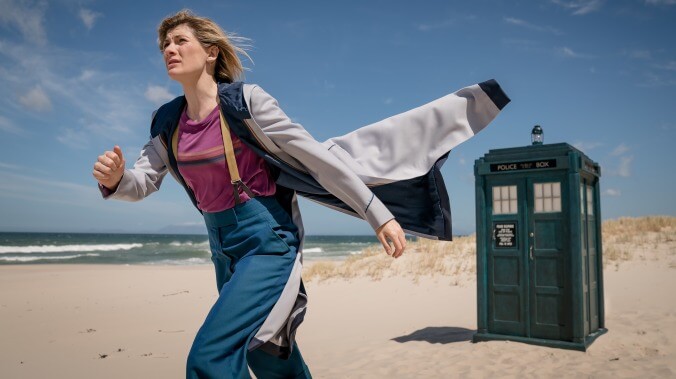Doctor Who serves up ecological horror with a side of romance


A missing submarine in the Indian Ocean, birds going haywire in Peru, and active alien tech in Hong Kong. Or is it a kidnapped astronaut, a missing travel vlogger, and a suspiciously well-equipped lab on a beach in Madagascar? From its opening moments, it’s clear that something is wrong in “Praxeus,” but this episode teases out its central mystery in thrilling fashion as the Doctor and her fam tackle a globe-trotting mystery on present day Earth. Like “Fugitive Of The Judoon,” this is a beautifully paced mystery box of an episode with a memorable supporting cast and a masterful control of tension and suspense. Unlike that mythos-shifting episode, however, “Praxeus” has the benefit of being a self-contained story with a beginning, middle, and end. Admittedly, it’s a little strange that we don’t get any real fallout from last week’s game-changing episode. But when the results are this fun it’s hard to mind too much.
My first thought upon finishing this episode was, “Poor ‘Orphan 55.’” That episode was already a weak spot in this otherwise strong season, but it really suffers in comparison to “Praxeus.” Tonight’s outing is also an ensemble story with a timely message about the dangers of climate change and pollution. Unlike “Orphan 55,” however, “Praxeus” allows its pointed message to flow naturally from its sci-fi storytelling, rather than beating us over the head with a clunky final monologue. Plus it proves it’s possible to tell a big ensemble story while ensuring the Doctor, her companions, and the guest stars all get time to shine.
Unlike the more abstract climate change/nuclear holocaust threat of “Orphan 55,” “Praxeus” locates a much more specific threat: Microplastics. When it comes to turning an everyday reality into a terrifying threat, “Praxeus” is right up there with “Blink.” After all, avoiding microplastics is as impossible as not blinking. As the Doctor explains, they’re in our air, our water, and our food—not to mention ourselves. And while this episode’s big threat is technically the titular alien bacteria that’s using those microplastics to spread across the Earth (an eerily timely parallel for the current concern over the coronavirus), it’s clear that the big takeaway here is meant to be Earth’s plastic pollution problem. The Doctor may be able to neutralize the deadly bacteria, but the threat of microplastics remains. As she puts it, “You’re poisoning yourselves as well as your planet.”
From manic infected birds that recall, well, The Birds, to terrifying images of people scaling over and exploding, “Praxeus” is an effectively unsettling hour. But what really elevates it is its character work. As in his previous episode, “Kerblam!” Pete McTighe (who co-wrote this episode with Chris Chibnall) demonstrates an impressive knack for creating characters who immediately feel lived-in. Juggling a larger TARDIS team has been a hindrance for a lot of writers in this era of the show, but McTighe knows how to balance the bigger cast size to his advantage. As has become a recent trend this season, “Praxeus” starts by introducing its guest cast first and then throws our TARDIS team into the mix. And because the 13th Doctor is very into delegating, those introductions happen all around the world.
Ryan runs into travel vlogger Gabriela (Joana Borja) on a polluted river in Peru, while Yaz and Graham team up with British ex-cop Jake Willis (Warren Brown) in Hong Kong, where he’s searching for his missing astronaut husband Adam Lang (Matthew McNulty). Meanwhile, the Doctor’s attempt to rescue a naval submarine survivor off the coast of Madagascar leads her to microfiltration scientists Suki Cheng (Molly Harris) and Aramu (Thapelo Maropefela). The introductions are swift and efficient, and the characters all pop. Plus McTighe and Chibnall play around with those initial pairings to unlock new dynamics too. When Yaz is determined to remain in Hong Kong and continue her own investigation, the similarly fearless Gabriela volunteers to stay behind and join her.
Thanks largely to Borja’s sparky performance, Gabriela emerges as one of those great “companions who might have been” characters. Between her love for travel and her no-nonsense yet up-for-anything demeanor, you could easily imagine an alternate universe in which this is her introductory episode as a new TARDIS traveler. The weakest element of her characterization is that she so quickly gets over the death of her friend (or girlfriend?) and fellow travel vlogger Jamila (Gabriela Toloi). But, hey, sometimes that’s par for the course for companions too.
Yet the heart of this episode ultimately belongs to Jake and Adam. “Praxeus” pauses its mystery for an absolutely lovely scene in which Jake opens up to Graham about the pressures of being married to a beloved astronaut and the way it’s made him sabotage their relationship due to his own insecurities. It’s only once Adam’s life is in jeopardy that Jake realizes just how much he stands to lose. Though Grace isn’t mentioned by name, her presence hangs over the scene as Jake asks Graham if he knows what it’s like to be married to someone so impressive. Adam is slightly less well-developed than his husband, but the scene where he and the Doctor discuss life aboard the International Space Station is another nice character beat.
Jake and Adam’s relationship also reflects the wonderfully low-key approach to LGBT representation that Doctor Who has embraced since the beginning of its 2005 run. Though the episode twice feigns at making theirs a doomed romance (first with Adam’s infection and then with Jake’s climatic flight), they ultimately emerge as our romantic heroes, not another entry in the “Bury Your Gays” trope. The Doctor, it turns out, is a romantic, and the relief of Jake’s survival is such a rush, it made me willing to forgive the clichéd plot device of a malfunctioning autopilot that requires someone to sacrifice their live to save the day.
Indeed, for as fun and emotional as it is, “Praxeus” has its flaws too. It sets up a larger mystery about Jamila’s disappearance that’s never followed up on, and, most egregiously of all, Aramu is killed without anyone noticing or even commenting upon his absence. I’m still not clear if he was a member of Suki’s alien race or just a poor human who accidentally got sucked into this mess. I have similar questions about how long Suki’s alien race were operating on Earth and what exactly they were doing with Adam in Hong Kong.
In fact, working on this review has made me think of even more nits to pick. (Who sent Jake the text telling him to rescue Adam?) On the whole, however, the weaker third act doesn’t feel like the worst tradeoff for the suspenseful thrill ride of the rest of the episode. Maybe that’s because, for all its plot wonkiness, “Praxeus” at least delivers big, meaty ideas to chew over after it’s done. The reveal that Suki’s alien race have been using the Earth as their test subject calls to mind questions about the ethics of scientific research—from animal testing to unethical human experimentation. Meanwhile, the Doctor’s final plea to work with Suki doubles as a metaphor for the importance of the scientific community tackling the climate crisis on a global-level, not just within nationalistic borders. The Doctor may beat herself up for being too immediately trusting of a fellow scientist, but maybe the bigger problem is that Suki wasn’t trusting enough.
Following up “The Fugitive Of The Judoon” with such a standalone hour was certainly a risk, and one that will no doubt frustrate some viewers. Between the Timeless Child, the lone Cyberman, and whatever’s going on with Doctor Ruth, Doctor Who has a lot of storylines to wrap up in just four episodes—which is maybe a sign that some of those mysteries are going to stretch on for longer than a season. But, taken on its own merits, “Praxeus” is an episode that feels wholly original while also calling to mind the best of what Doctor Who can do. It delivers propulsive sci-fi adventure, a metaphorical sci-fi message, and some lovely character work to boot. Maybe it just would’ve worked better slotted into the “Orphan 55” spot instead.
Stray observations
- In what’s maybe been more of an active throughline than I’ve given it credit for, this episode confirms that Doctor Who is setting up a storyline about Yaz becoming an independent Doctor-like figure in her own right. So far, there’s effective ambiguity over whether that’s a good thing or not.
- Speaking of which, I enjoyed Yaz’s disappointment that she hadn’t actually stumbled upon a new alien planet, just a secret underwater alien vessel.
- I can’t decide if Gabriela’s suggestion that the Doctor come find them again sometime is just a nice little button for the end of the episode or a hint that the trio might actually return at some point.
- For someone who’s clearly proud of her vlogging career, Gabriela doesn’t actually do a whole lot of vlogging in this episode. (And surely she’d have better camera equipment than just a phone, right?)
- If you want to learn more about microplastics, the YouTube channel Kurzgesagt released a really great video breaking it all down (pun intended):